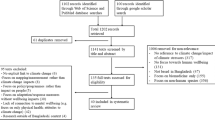
Overview
- Explores practical implications for one of the most burning cultural and political issues of our time
- Questions how to best understand peoples' responses to climate change
- Argues that climate change requires a dedicated and specialist research methodology
- Contends that mainstream psychological focus on behaviour, attitudes and individual actions is not the way forward in climate change studies
Part of the book series: Studies in the Psychosocial (STIP)
Access this book
Tax calculation will be finalised at checkout
Other ways to access
About this book
This book investigates the psycho-social phenomenon which is society’s failure to respond to climate change. It analyses the non-rational dimensions of our collective paralysis in the face of worsening climate change and environmental destruction, exploring the emotional, ethical, social, organizational and cultural dynamics to blame for this global lack of action.
The book features eleven research projects from four different countries and is divided in two parts, the first highlighting novel methodologies, the second presenting new findings. Contributors to the first part show how a ‘deep listening’ approach to research can reveal the anxieties, tensions, contradictions, frames and narratives that contribute to people’s experiences, and the many ways climate change and other environmental risks are imagined through metaphor, imagery and dreams.
Using detailed interview extracts drawn from politicians, scientists and activists as well as ordinary people, thesecond part of the book examines the many different ways in which we both avoid and square up to this gathering disaster, and the many faces of alarm, outrage, denial and indifference this involves.
Similar content being viewed by others
Keywords
Table of contents (13 chapters)
-
Front Matter
-
Mostly Methods
-
Front Matter
-
-
Mostly Findings
-
Front Matter
-
-
Back Matter
Reviews
“A valuable and timely addition to climate psychology, a newly emerging field whose subject is how people are relating to climate change. The authors use qualitative research methods to explore people’s conscious - and not so conscious - feelings about climate change, with groups studied fascinatingly including climate scientists, activists and also children. I believe reading these papers helps us understand some of our own mixed and varied feelings about climate change. Paul Hoggett, in his introduction, usefully summarises the psycho-social approach taken by the authors and he clarifies differences in the qualitative research models they have developed and applied. The authors share in common a deep interest in peoples' subjective experience and a deep sympathy for the difficulty in facing climate change. A thoroughly good read, accessible and highly recommended.” (Sally Weintrobe, psychoanalyst, climate psychologist and editor of Engaging with Climate Change (2013))
Editors and Affiliations
About the editor
Paul Hoggett is Emeritus Professor of Social Policy at the University of West England, UK. Paul is the co-founder of the Climate Psychology Alliance, is a psychoanalytic psychotherapist and has worked as a group relations consultant over many years.
Bibliographic Information
Book Title: Climate Psychology
Book Subtitle: On Indifference to Disaster
Editors: Paul Hoggett
Series Title: Studies in the Psychosocial
DOI: https://doi.org/10.1007/978-3-030-11741-2
Publisher: Palgrave Macmillan Cham
eBook Packages: Behavioral Science and Psychology, Behavioral Science and Psychology (R0)
Copyright Information: The Editor(s) (if applicable) and The Author(s), under exclusive license to Springer Nature Switzerland AG, part of Springer Nature 2019
Softcover ISBN: 978-3-030-11740-5Published: 12 June 2019
eBook ISBN: 978-3-030-11741-2Published: 01 June 2019
Series ISSN: 2662-2629
Series E-ISSN: 2662-2637
Edition Number: 1
Number of Pages: XV, 270
Number of Illustrations: 2 b/w illustrations, 3 illustrations in colour
Topics: Popular Science in Psychology, Community and Environmental Psychology, Psychosocial Studies, Climate Change, Climate Change Management and Policy, Climate Change/Climate Change Impacts



